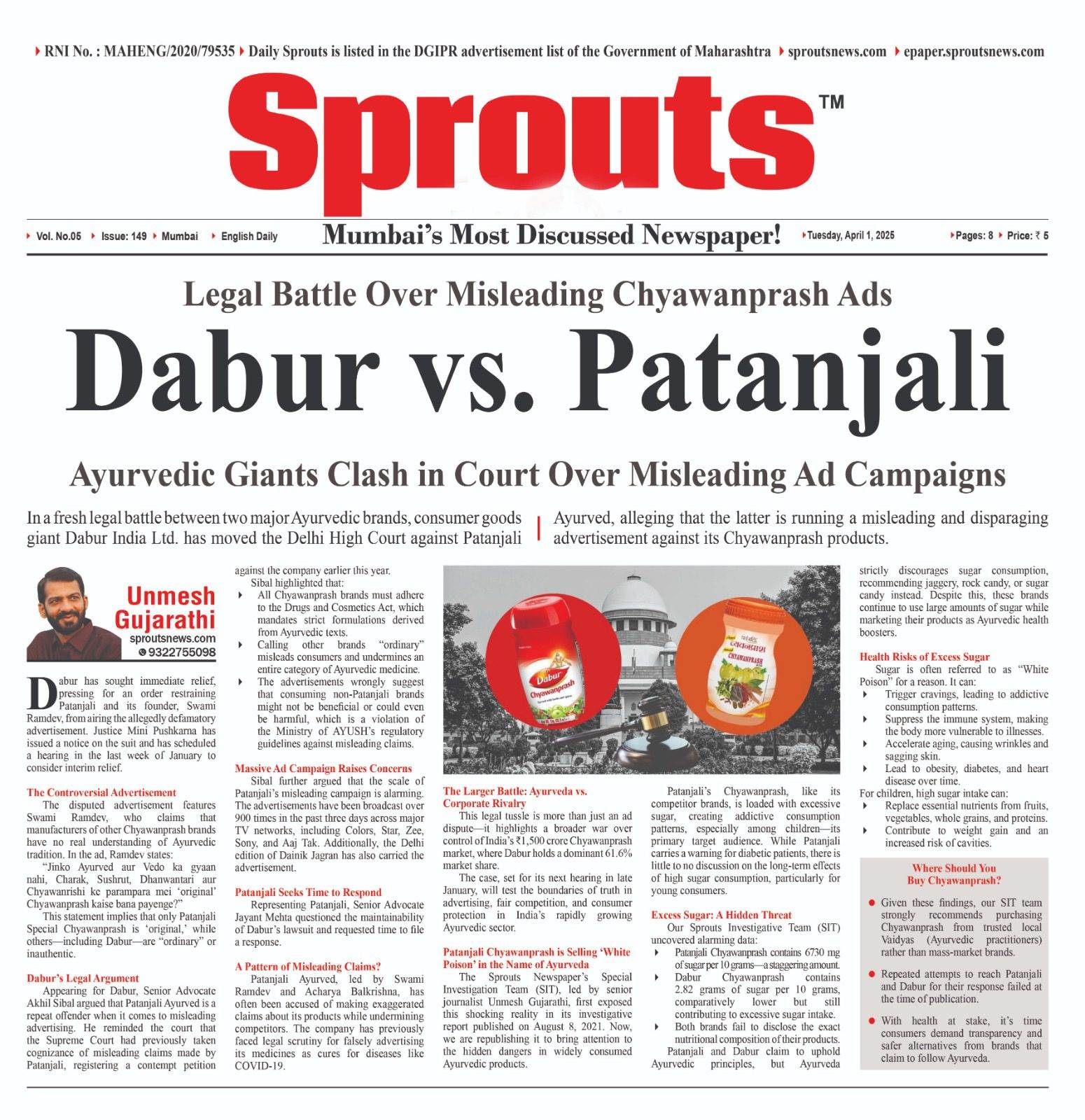– Patanjali Faces Court Over ‘Ordinary’ Chyawanprash Claims
– Dabur Takes Patanjali to Court for Defamatory Advertisement
– Ayurvedic Giants Clash in Court Over Misleading Ad Campaigns
Unmesh Gujarathi
Sprouts News Exclusive
In a fresh legal battle between two major Ayurvedic brands, consumer goods giant Dabur India Ltd. has moved the Delhi High Court against Patanjali Ayurved, alleging that the latter is running a misleading and disparaging advertisement against its Chyawanprash products.
Dabur has sought immediate relief, pressing for an order restraining Patanjali and its founder, Swami Ramdev, from airing the allegedly defamatory advertisement. Justice Mini Pushkarna has issued a notice on the suit and has scheduled a hearing in the last week of January to consider interim relief.
• The Controversial Advertisement
The disputed advertisement features Swami Ramdev, who claims that manufacturers of other Chyawanprash brands have no real understanding of Ayurvedic tradition. In the ad, Ramdev states:
“Jinko Ayurved aur Vedo ka gyaan nahi, Charak, Sushrut, Dhanwantari aur Chyawanrishi ke parampara mei ‘original’ Chyawanprash kaise bana payenge?”
This statement implies that only Patanjali Special Chyawanprash is ‘original,’ while others—including Dabur—are “ordinary” or inauthentic.
• Dabur’s Legal Argument
Appearing for Dabur, Senior Advocate Akhil Sibal argued that Patanjali Ayurved is a repeat offender when it comes to misleading advertising. He reminded the court that the Supreme Court had previously taken cognizance of misleading claims made by Patanjali, registering a contempt petition against the company earlier this year.
Sibal highlighted that:
– All Chyawanprash brands must adhere to the Drugs and Cosmetics Act, which mandates strict formulations derived from Ayurvedic texts.
– Calling other brands “ordinary” misleads consumers and undermines an entire category of Ayurvedic medicine.
– The advertisements wrongly suggest that consuming non-Patanjali brands might not be beneficial or could even be harmful, which is a violation of the Ministry of AYUSH’s regulatory guidelines against misleading claims.
• Massive Ad Campaign Raises Concerns
Sibal further argued that the scale of Patanjali’s misleading campaign is alarming. The advertisements have been broadcast over 900 times in the past three days across major TV networks, including Colors, Star, Zee, Sony, and Aaj Tak. Additionally, the Delhi edition of Dainik Jagran has also carried the advertisement.
Also Read: Dabur vs. Patanjali
• Patanjali Seeks Time to Respond
Representing Patanjali, Senior Advocate Jayant Mehta questioned the maintainability of Dabur’s lawsuit and requested time to file a response.
• A Pattern of Misleading Claims?
Patanjali Ayurved, led by Swami Ramdev and Acharya Balkrishna, has often been accused of making exaggerated claims about its products while undermining competitors. The company has previously faced legal scrutiny for falsely advertising its medicines as cures for diseases like COVID-19.
• The Larger Battle: Ayurveda vs. Corporate Rivalry
This legal tussle is more than just an ad dispute—it highlights a broader war over control of India’s ₹1,500 crore Chyawanprash market, where Dabur holds a dominant 61.6% market share.
The case, set for its next hearing in late January, will test the boundaries of truth in advertising, fair competition, and consumer protection in India’s rapidly growing Ayurvedic sector.
• Patanjali Chyawanprash is Selling ‘White Poison’ in the Name of Ayurveda
The Sprouts Newspaper’s Special Investigation Team (SIT), led by senior journalist Unmesh Gujarathi, first exposed this shocking reality in its investigative report published on August 8, 2021. Now, we are republishing it to bring attention to the hidden dangers in widely consumed Ayurvedic products.
Patanjali’s Chyawanprash, like its competitor brands, is loaded with excessive sugar, creating addictive consumption patterns, especially among children—its primary target audience. While Patanjali carries a warning for diabetic patients, there is little to no discussion on the long-term effects of high sugar consumption, particularly for young consumers.
• Excess Sugar: A Hidden Threat
Our Sprouts Investigative Team (SIT) uncovered alarming data:
– Patanjali Chyawanprash contains 6730 mg of sugar per 10 grams—a staggering amount.
– Dabur Chyawanprash contains 2.82 grams of sugar per 10 grams, comparatively lower but still contributing to excessive sugar intake.
– Both brands fail to disclose the exact nutritional composition of their products.
Patanjali and Dabur claim to uphold Ayurvedic principles, but Ayurveda strictly discourages sugar consumption, recommending jaggery, rock candy, or sugar candy instead. Despite this, these brands continue to use large amounts of sugar while marketing their products as Ayurvedic health boosters.
• Health Risks of Excess Sugar
Sugar is often referred to as “White Poison” for a reason. It can:
– Trigger cravings, leading to addictive consumption patterns.
– Suppress the immune system, making the body more vulnerable to illnesses.
– Accelerate aging, causing wrinkles and sagging skin.
– Lead to obesity, diabetes, and heart disease over time.
For children, high sugar intake can:
– Replace essential nutrients from fruits, vegetables, whole grains, and proteins.
– Contribute to weight gain and an increased risk of cavities.
• Where Should You Buy Chyawanprash?
Given these findings, our SIT team strongly recommends purchasing Chyawanprash from trusted local Vaidyas (Ayurvedic practitioners) rather than mass-market brands.
Repeated attempts to reach Patanjali and Dabur for their response failed at the time of publication.
With health at stake, it’s time consumers demand transparency and safer alternatives from brands that claim to follow Ayurveda.





I loved as much as you will receive carried out right here. The sketch is attractive, your authored material stylish. nonetheless, you command get got an shakiness over that you wish be delivering the following. unwell unquestionably come further formerly again as exactly the same nearly very often inside case you shield this hike.
The very root of your writing whilst appearing reasonable initially, did not sit perfectly with me after some time. Someplace throughout the sentences you were able to make me a believer unfortunately just for a very short while. I however have got a problem with your leaps in assumptions and one would do well to help fill in those gaps. In the event you actually can accomplish that, I would certainly end up being fascinated.